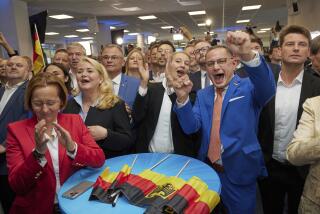The Center Appears to Hold in Russia : Extremists’ gains in election are far from a death notice for reform and the moderates
Pulled to the left by nostalgia for the job security that existed under Communism and to the right by shallow promises of a nationalist agenda, Russians went to the polls Sunday in vast numbers and voted for extremes. But the democratic center may hold yet.
As predicted, the Communist Party, led by Gennady A. Zyuganov, and the nationalist party of Vladimir Zhirinovsky did well in the parliamentary elections, Russia’s second since the collapse of the Soviet Union. When complete results are tabulated, perhaps within a week, the extremist parties will have increased their representation in the Duma, or lower house of parliament. But the results, which could be interpreted as a humiliating defeat for President Boris N. Yeltsin and even more so for Prime Minister Viktor S. Chernomyrdin of the Our Home Is Russia Party, do not mean that centrist reforms are in imminent danger of being erased.
The average Russian, concerned about rampant corruption and crime and desperate for job stability, has voted to tap the brakes, to seek a more moderate approach to the free-market reforms that Yeltsin and Chernomyrdin have championed. But even Communist Party leader Zyuganov said Russia does not need “a sharp political turn to the left or elsewhere.” U.S. officials agreed, saying that the elections had not greatly shifted the balance of power and that Washington expected reform and democracy to move ahead.
Indeed, it would be a mistake to make too much of the results. In a presidentialist regime like Russia’s, the lower house of parliament does not carry great political weight. Furthermore, there will be a welter of political parties represented in the Duma, making any single party incapable of wielding too much clout. This fragmentation will lead parties to seek political alliances with others in order to get business done. The Communists can work out an alliance with the neo-fascists, but the gravity in the legislature most probably will lie in the center. That is good news for Yeltsin, for it takes two-thirds of the seats to override a presidential veto.
Yeltsin has six months to deliver widely accepted change before the real test for the reform movement, the June 6 presidential election. Yeltsin, still recovering from his second heart attack, intends to run. So may others from the centrist camp. And the standard-bearers of the extremist parties will try to capitalize on their current victory. But the situation in June is speculation in December.
For the time being, these are the only certain lessons of this election: The voter turnout was larger than expected, with perhaps 65% of the 105 million eligible voters casting ballots. And the growth of the political opposition is undeniable.
More to Read
Sign up for Essential California
The most important California stories and recommendations in your inbox every morning.
You may occasionally receive promotional content from the Los Angeles Times.










